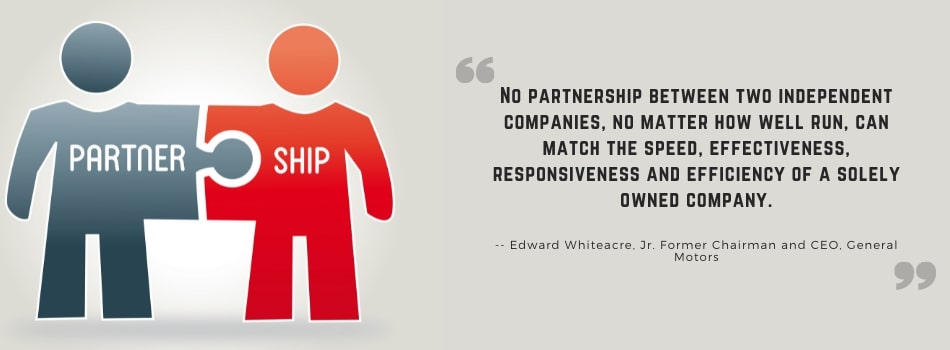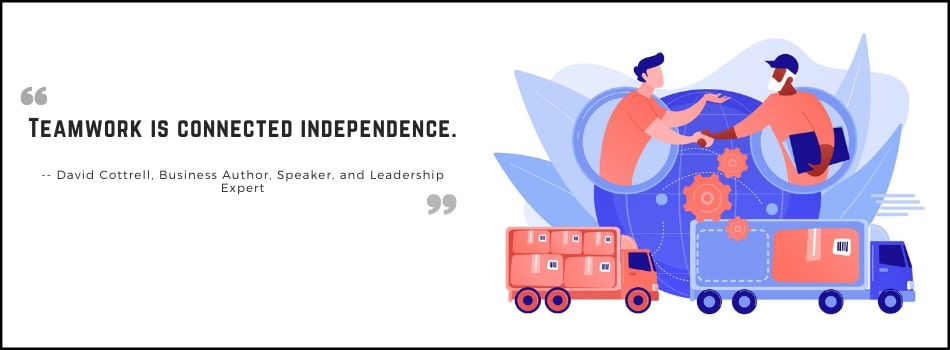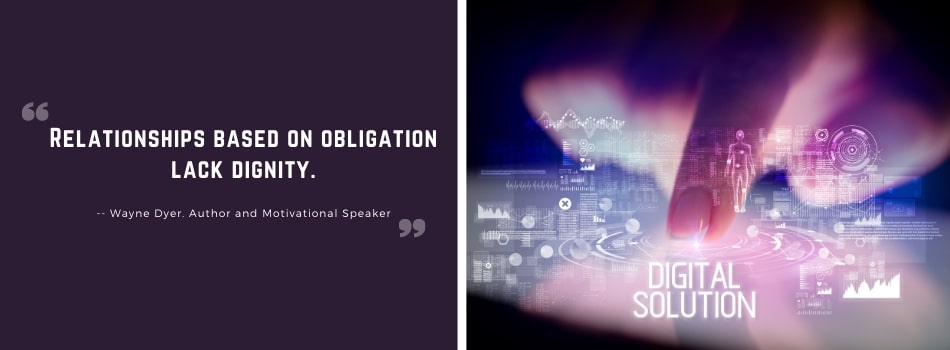A recent catch-up session with one of our software suppliers left me reflecting on how business relationships are changing, primarily in their focus and perceived value.
Partly to process those reflections internally, and equally for you to consider before engaging a supply chain or business consulting firm, I thought I’d share my perception of an emerging development in partnership culture, seemingly fuelled by the popularity of cloud delivery for enterprise software.
While undoubtedly beneficial and appropriate in many current business scenarios, partnership culture is challenging consulting companies like ours that believe we serve our clients best by acting independently and agnostically to drive desirable outcomes.
Partnerships: Essential in Supply Chain, Less So in Consulting
At Logistics Bureau, we’re in the supply chain game, and if you’re in it too, you know that it’s one in which a reliance on partners is nothing new. Indeed, few supply chains can operate at all without partnerships between a company, its suppliers, its customers, and logistics service providers.
This need for a symbiotic existence doesn’t require much explanation, as it’s the very nature of the process needed to take raw materials, manufacture them into products that people need, and then sell and deliver them to those people. That’s the way it has worked for centuries.
However, the same cannot be said for the professional services sphere and those enterprises operating within it.
As one of those enterprises, Logistics Bureau has always prided itself on its independence and an agnostic approach to finding solutions for its customers. It’s one of our core values, and it has served our clients and our business admirably for more than two decades.
Nevertheless, a recent meeting with a software vendor brought home to me how profoundly digital technology, primarily when provided via cloud-hosted SaaS delivery models, influences the focus of business relationships. It’s a factor that may, in time, make it less easy for professional service providers to remain independent.
The Problem with Vendor/Consultant Partnerships
For me, it’s not hard to see the conflict that partnerships with vendors would ignite in our business.
We could no longer serve our clients with objectivity if we were committed to supporting a specific brand, manufacturer, or vendor. Without such a commitment, though, there can be no partnership—hence we choose to remain independent.
Additionally, partnerships throw up other issues which would impact our services. Confidentiality, for instance, often features as a critical condition under which a client engages us. Collaborating with vendors or service providers would inevitably jeopardise our ability to guarantee 100% confidentiality.
Even if we were able to promise confidentiality, it would harm a client’s trust in us if we were known to collaborate with other agencies as part of our service provision, and something should leak during our engagement. As sure as we might be that the leak did not originate from us or our “partner”, the onus would be on us to prove that—or pay the opportunity cost of a client that’s no longer sure of our integrity.
The Pressure to Partner
So what’s the rub? Well, here it is…
As much as the supply chain and logistics industry depends on good business relationships, innovative thinking, robust processes, and effective management, digital technology is pervasive.
Let’s face it, IT has revolutionised the way supply chains operate, and it would be unreasonable to think that it will not continue to do so. Short of an almost literal return to the dark ages, we need digital innovation. The more technological sophistication we can apply to supply chain management and logistics execution, the greater the results will be for all concerned.
But behind every technological solution, as mentioned, is a proprietor. In the case of cloud solutions, this is critical because software customers no longer buy the product. Instead, they pay to use it.
It’s a model with many mutual benefits for software customers and vendors. Nonetheless, it pays the vendor handsomely to a) ensure the customer will use the product for the longest possible time and b) encourage adoption by the most significant number of users possible.
But We Want to Use Software, Not Sell It!
As consultants, we rely on the speed and efficiency of modeling software to help us give clients the answers they need. However, this is where the trend towards business partnership may soon begin to make objective consulting a more challenging service to provide.
Unlike general business software, such as MS Office, or even sophisticated enterprise solutions like SAP, best-of-breed supply chain applications may not be readily available to smaller consulting firms for much longer. At the very least, acquiring them could become a lot more challenging for those wishing to retain independence and impartiality.
Portentously, one of our technology suppliers recently informed us that if we wish to continue using their product as a tool for our consulting projects, we will need to partner with them and market their product to our clients.
Furthermore, we would need to inform the vendor about every project on which we use the software, providing information about the client and the purpose for which the technology would be used.
Although selling products goes against all our core values, and we don’t wish to operate in the realm of software reselling, these were the only conditions under which we would be allowed to retain access to the tool in question.
An Incredulous Proposal?
While it was clear that the proposal seemed perfectly reasonable to the vendor, my vexation with it is best explained using an analogy.
For example, would it be reasonable for a truck manufacturer to impose similar obligations on 3PL logistics providers or carriers?
Imagine the incredulity if you are a 3PL manager and the truck manufacturer says the following to you:
“You can buy our trucks, but only if you tell us about every client whose goods you carry on them, what goods you carry for them, for what purpose—and while we’re at it, we want you to help us sell your clients a truck or two. If you don’t agree to comply with these conditions, you won’t be buying any trucks from us.”
That’s pretty much the essence of the ultimatum we received from our former software vendor. As a result, we no longer work with their product and have sourced an alternative while considering our longer-term technology strategy.
Planning for Change
It will be interesting to see if, as time goes on, other vendors in the same software niche place similar contractual demands on their customers in the consulting profession.
If such expectations become the norm, companies like ours will find it increasingly difficult to operate without divesting ourselves of the objectivity and impartiality our clients expect. That is a path that Logistics Bureau will never take!
As much as anything, this scenario highlights how changes in business relationships and the rapid evolution of problem-solving technology could bring about transformation in the consulting industry.
We’re basing our longer-term plans on the possibility that if we want to continue using specialist modelling software to improve project outcomes for our clientele, we need to get into bed with specific vendors or start developing software products for ourselves.
The first option goes against our principles, and is therefore out of the question. Consequently, we are pursuing the second option, although it is costly and involves diversification into tech development alongside our roles as experts in business practice and process.
How Do You Feel About Consultant/Vendor Partnerships?
It has been somewhat cathartic to reflect on our software-vendor mini-crisis, but aside from that, I guess it could be helpful as food for thought if your business seeks help from a consulting company at some future point.
For instance, I’d love to know your thoughts on the following questions:
- · Would you be comfortable engaging a professional services company, knowing it was locked into collaborative partnerships with software, systems, or equipment vendors and obliged to market their products?
- · How critical do you see the need for independence and vendor-impartiality in the services offered by a consulting firm?
It’s always good to receive the perspectives of the types of companies we serve, so I welcome your views in the comments section below.
However, at Logistics Bureau, our position is clear—we will do what is necessary to stay independent, be true to our core values and avoid exposure to the potential issues arising from vendor partnerships. We’ll continue to embrace the best digital tools available to help our clients understand, manage, and improve their supply chains—but we won’t be selling software any time soon.
Editor’s Note: This post was originally published on July 20, 2021, under the title “Staying Independent in the Age of Enterprise Partnership Culture” on Logistics Bureau’s website.








